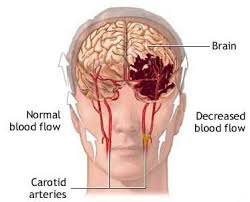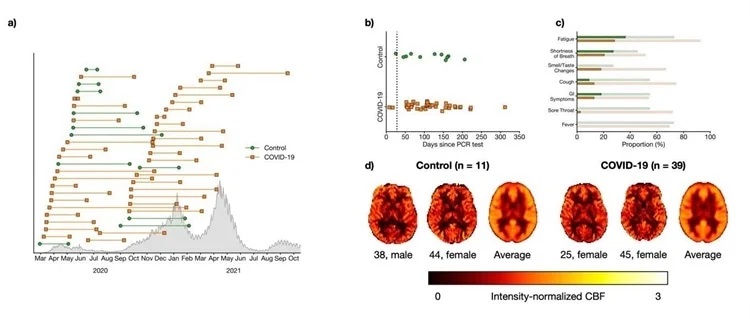BREAKING! Canadian Study Reveals That Majority Of Non-Hospitalized COVID-19 Infected Individuals Have Decreased Cerebral Blood Flow!
Source: NeuroCOVID May 11, 2022 3 years, 9 months, 2 days, 18 hours, 59 minutes ago
NeuroCOVID: A new study by researchers from the University of Toronto-Canada, Sunnybrook Research Institute-Canada, Baycrest Academy for Research and Education-Canada and McMaster University-Canada have found that majority of non-hospitalized COVID-19 infected individuals have decreased cerebral blood flow that can contribute to various clinical manifestations and Long COVID issues.

To date, the long-term consequences of COVID-19) on brain physiology and function are not yet well understood.
The study team examined cerebral blood flow (CBF) in 50 participants recruited to one of two groups: 1) adults who previously self-isolated at home due to COVID-19 (n = 39; 116.5 ± 62.2 days since positive diagnosis), or 2) controls who experienced flu-like symptoms but had a negative COVID-19 diagnosis (n = 11).
All participants underwent arterial spin labeling magnetic resonance imaging at 3 T to yield measures of CBF. Voxel-wise analyses of CBF were performed to assess for between-group differences, after controlling for age and sex.
Shockingly, relative to controls, the COVID-19 group exhibited decreased CBF in the thalamus, orbitofrontal cortex, and regions of the basal ganglia. Within the COVID-19 group, CBF differences in occipital and parietal regions were observed between those with (n = 11) and without (n = 28) self-reported on-going fatigue.
The study findings suggest long-term changes in brain physiology in adults across the post-COVID-19 timeframe. Moreover, CBF may aid in understanding the heterogeneous symptoms of the post-COVID-19 condition. Future longitudinal studies are needed to further characterize the consequences of COVID-19 on the brain.
The study findings were published on a preprint server and are currently being peer reviewed.
https://www.medrxiv.org/content/10.1101/2022.05.04.22274208v1
It has been observed that symptoms including fatigue and brain fog have been reported by patients even after the course of a severe acute respiratory syndrome coronavirus 2 (SARS-CoV-2) infection. The long-term effects of SARS-CoV-2 infection on the brain, however not fully understood.
The study team performed arterial spin labeling (ASL) magnetic resonance imaging (MRI) to investigate the effect of COVID-19 on the cerebral blood flow (CBF) in non-hospitalized COVID-19-recovered adults.
The researchers enrolled participants aged between 20 and 75 from May 2020 to September 2021 as part of the
NeuroCOVID-19 protocol. The eligible participants were positive for SARS-CoV-2 via a real-time reverse transcription-polymerase chain reaction (rtRT-PCR) test performed on an oropharyngeal and/or nasopharyngeal swab.
The research participants were subsequently classified into two groups: (1) the COVID-19 group, including individuals who previously self-isolated following a COVID-19 diagnosis, and (2) the control group, including individuals who tested negative for COVID-19 but reported flu-like symptoms.
For the study, the primary outcome included the measurement of ASL-derived CBF. The secondary outcomes were estimated using: (1) a questionnaire regarding flu-like symptoms an
swered by patients; (2) the cognition and emotion batteries from the National Institutes of Health (NIH) toolbox; and (3) the University of Pennsylvania smell identification test (UPSIT).
All the participants were asked to complete a questionnaire in which they indicated the symptoms they were experiencing currently, had experienced previously, or if they had never experienced any flu-like symptoms including sore throat, cough, fever, fatigue, shortness of breath, smell/taste changes, and/or gastrointestinal symptoms.
 a) Timing of PCR test (left marker) and assessment (right marker) for COVID-19 (orange squares) participants and controls (green circle). Confirmed cases in Ontario are shown in grey. b) Number of days between PCR test and assessment. The black dotted line indicates 28 days, an established threshold beyond which symptoms can be considered part of the post- COVID-19 condition. c) Proportion of participants who self-reported flu-like symptoms. Faint bars indicate participants whose symptoms had resolved by the time of the assessment while dark bars indicate participants with on-going symptoms. d) Representative and group-averaged CBF maps from both groups.
a) Timing of PCR test (left marker) and assessment (right marker) for COVID-19 (orange squares) participants and controls (green circle). Confirmed cases in Ontario are shown in grey. b) Number of days between PCR test and assessment. The black dotted line indicates 28 days, an established threshold beyond which symptoms can be considered part of the post- COVID-19 condition. c) Proportion of participants who self-reported flu-like symptoms. Faint bars indicate participants whose symptoms had resolved by the time of the assessment while dark bars indicate participants with on-going symptoms. d) Representative and group-averaged CBF maps from both groups.
Importantly, the cognition battery from the NIH toolbox, a computerized assessment developed to measure the full spectrum of emotional health, generated two age-corrected standard scores of crystallized and fluid cognition, while the emotion battery generated three T-scores representing social satisfaction, negative affect, and well-being. In addition, the UPSIT resulted in scores that evaluated olfactory dysfunction.
The study team conducted comparisons between the COVID-19 and the control group as part of sensitivity analyses. The exploratory analysis assessed whether individuals who belonged to the COVID-19 group and reported fatigue as a current symptom displayed any CBF differences when compared to COVID-19 group individuals who reported previous experience of fatigue or no fatigue at all.
It was noted that at the time of enrollment, 50 participants, including 39 belonging to the COVID-19 cohort and 11 belonging to the control cohort, were eligible for the study. The study team screened COVID-19 group participants 116.5 ± 62.6 days after testing COVID-19 positive.
The research findings showed that among the COVID-19 and control participants, 28.2% and 36.4% reported fatigue, and 20.5% and 27.3% had shortness of breath, respectively.
Significantly, 92.3% of the COVID-19 and 72.7% of the control individuals reported fatigue between the time points of the PCR test and assessment. Moreover, smell/ taste alterations were experienced by more COVID-19 group participants than the control persons. Notably, there were no significant differences between the two groups concerning the cognitive and emotion tests, or the UPSIT scores.
Shockingly, it was discovered that the COVID-19 group displayed significantly reduced CBF in voxel clusters that encompassed the orbitofrontal cortex, thalamus, and the regions such as the caudate, nucleus accumbens, pallidum, and putamen of the basal ganglia. Also, there were no voxel clusters in the COVID-19 group with CBF higher than in the controls.
Following partial volume correction, sensitivity analysis showed smaller clusters than those observed in the primary analysis. Again, CBF levels higher than those in the control group were observed in none of the COVID-19 group clusters. On the other hand, the exploratory analyses showed CBF differences among individuals from the COVID-19 group who did and did not report ongoing fatigue. Ongoing fatigue was defined to have increased CBF in the superior occipital and parietal regions with lower CBF levels in the inferior occipital regions (lingual gyrus, occipital fusiform gyrus, intracalcarine cortex, precuneous cortex).
The study findings showed a decrease in CBF in those recovering from COVID-19 as compared to controls. The CBF differences with respect to ongoing fatigue as reported by the COVID-19 group suggested the role of CBF in heterogeneous symptoms related to the post-COVID-19 condition. As a whole, the study concluded that post-COVID-19 symptoms are associated with long-term changes in brain physiology and function.
For more on
NeuroCOVID, keep on logging to Thailand Medical News.

